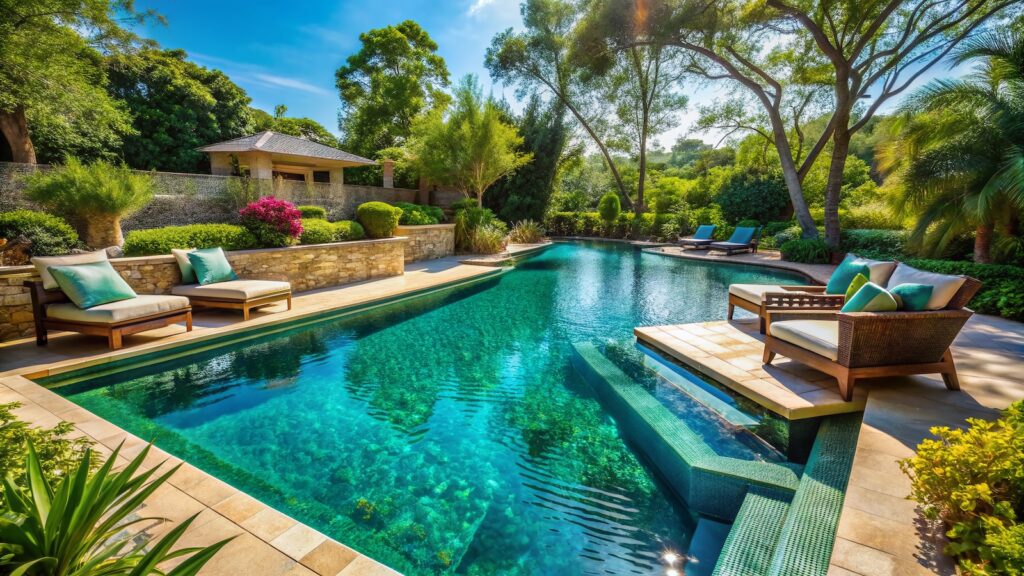Like many Florida homeowners, you moved to areas like Parrish, St. Petersburg, and Clearwater to enjoy the year-round temperate climate and stunning coastlines with great water views. But what if you could create a relaxing water retreat in your own backyard? At WinWay Pools, many of our clients are doing just that with a custom saltwater pool for a “spa-like” feel that even comes with health benefits.
While there are many benefits of a saltwater pool, it is important to note that saltwater systems do produce chlorine. In this blog, we’ll provide a quick overview of how a saltwater system works and the key benefits compared to a more traditional chlorinated pool.
The Science of Sanitation: How a Saltwater System Works
Saltwater systems use a natural process to create chlorine, called electrolysis, where a saltwater generator converts the salt added to your water into chlorine. Here are some of the basics of the science behind electrolysis, from Orenda Technologies.
- First, electrolysis converts chlorides into chlorine gas, which also produces sodium hydroxide.
- When salt dissolves in water, the sodium separates from the chloride. The electricity converts the chlorides into chlorine gas, and the byproducts are sodium hydroxide and hydrogen gas. The chlorine gas dissolves in water to create hypochlorous acid and hydrochloric acid.
- This process kills (oxidizes) contaminants in the pool water. The entire process is driven by the water’s conductivity, based on water temperature and salinity (level of salt).
Fortunately WinWay Pools, you don’t have to understand how all this chemistry works, because saltwater systems do most of the above automatically.
5 Basics of a Saltwater Pool System
Instead of buying chlorine to sanitize your pool, a saltwater system simply requires adding pool-grade salt to the water, which then gets converted into chlorine. Here are the basics of how a saltwater pool system works:
Start with salt: First, you add salt directly to your pool water, which then cycles through an installed salt cell unit.
Salt cell operation: The system’s control panel delivers electricity to the salt cell. As saltwater passes through “fins” within the cell, electrolysis occurs, converting the salt (sodium chloride) into chlorine that sanitizes the water.
Testing and chemistry: The chlorine generated appears as “free chlorine” on standard test strips. Fortunately, no specialized test is needed except to check salinity levels.
Placement matters: The salt cell should always be installed on the return (post-filter) side, after the filter and before any pool heaters, ensuring only clean, filtered water enters the cell and is properly sanitized
Benefits of a Saltwater Pool
Salt Is Safer to Handle Than Chlorine
It takes a lot of salt to operate a saltwater pool — around 3,200 to 3,500 parts per million — but salt is much safer to handle and store than traditional solid or powdered chlorine. Improper storage or use of chlorine can be hazardous, posing risks of poisoning, corrosion, and fire. A saltwater generator eliminates these concerns, making your pool environment safer.
Saltwater Pool Maintenance Costs Less
Saltwater pools are easier and cheaper to maintain. While saltwater systems may cost more up front compared to a traditional chlorinated system, salt costs less than chlorine. And with a new saltwater pool, you’ll never have to worry about buying chlorine again.
Salt Increases Chlorine Stability
One of the key reasons saltwater pools are easier to maintain is that the saltwater system automatically monitors and releases a slow, steady flow of chlorine to keep the chlorine levels consistent. This means more time enjoying your pool, instead of manually monitoring chlorine levels.
Saltwater Is Better for Your Health
For sensitive swimmers whose eyes are normally irritated by chlorine, saltwater pools are a gentler alternative compared to traditional chlorinated pools. They’re also much gentler on your eyes compared to seawater, which has around 35,000 parts per million. The salt level in saltwater pools closely mimics human tears, with only about 3,500 parts per million, significantly reducing eye irritation.
Highly chlorinated pools can cause lung irritation, aggravating asthma and allergy symptoms, and causing other breathing problems. Saltwater pools offer a milder alternative, alleviating concerns for those with lung conditions and making the swimming experience more comfortable and relaxing.
Most importantly, saltwater generators produce chlorine in the form of sodium hypochlorite and hypochlorous acid, which effectively neutralize bacteria and algae, keeping your pool as clean and sanitary as a traditional chlorinated pool.
A Saltwater Pool Is a Soothing Experience
While chlorinated pools can leave your skin feeling dry and itchy, saltwater pools have a different effect. The salt in the water smoothes and softens your skin, acting as a natural exfoliator. Plus, swimming is an excellent way to relax, and saltwater enhances this experience. Exposure to saltwater promotes the body’s natural relaxation processes, soothes sore muscles, and relieves pain and stiffness from arthritis.
Cons of a Saltwater Pool
Compared to traditional chlorinated pools, saltwater pools do have some drawbacks. Salt can be corrosive to certain pool components, so proper material selection (e.g., titanium heat exchangers) is essential during your custom pool’s design phase.
Saltwater systems also don’t work well in cooler climates. If the temperature goes below 60 degrees Fahrenheit, your saltwater system won’t produce chlorine. Fortunately, this is rarely an issue in areas like Pinellas County, Florida.
It’s also important to properly maintain your pool to prevent water-related illnesses. Fortunately, maintenance specialists can advise you on the best way to maintain the right balance of pH and chlorine levels to keep your pool water safe and clean. Here are some of the basics of saltwater pool maintenance from industry experts.
How to Maintain Your Saltwater Pool
According to industry experts like Pool Research, there’s a common misconception that saltwater pools don’t require any maintenance. While they are generally easier and less costly to maintain than traditional chlorine pools, proper maintenance is required to keep your pool pristine all year long.
As we noted above, a quality pool saltwater system can help you maintain proper chemistry, including your pool temperature and salinity. You must also regularly clean your pool, properly maintain the salt cell, and check that your pool water is circulating properly.
Below is a timetable of maintenance tasks to properly maintain your saltwater pool. These are especially important for pools in St. Petersburg and other parts of Pinellas County that get year-round use.
Daily
- Skim your pool to remove surface debris.
- Empty the skimmer basket.
- Run the pool pump for about 8 to 12 hours (more time is required in climates where the pool gets more sunshine). Note that the salt system will only create chlorine while the pool is on.
Weekly
- Shock the pool.
- This is the process where you test and adjust your chemical levels.
Monthly/Quarterly
- Backwash or rinse the filter cartridge, depending upon the filter type.
- Deep-clean all pool surfaces with a brush, vacuum, etc.
- Check the salt cell (this may only be required quarterly). Scale will build up over time and needs to be removed with a specialty acid solution. It’s recommended to contact a maintenance professional to perform this service
Pool Pro Tip: Pool industry experts like Swim University recommend using six or seven 40-pound bags of pool-grade salt for about 10,000 gallons of water to reach the optimal level of 3,200 to 3,500 parts per million.
Saltwater Pool Luxury Made Simple With WinWay Pools
The industry experts at WinWay Pools can help you design a custom saltwater pool as an alternative to traditional chlorine pools. Our team works closely with top manufacturers and engineers to specify pool equipment and advanced saltwater systems that effectively neutralize bacteria and algae, keeping your pool as clean and sanitary as a traditional chlorinated pool.
We can help you design a luxurious swimming environment to enjoy the health benefits of a saltwater pool, without the sand and grit of the ocean, and without the unpleasant “chlorine smell” of a traditional chlorine pool.
Whether you’re building in St. Petersburg, Clearwater, Parrish, or anywhere along Florida’s Gulf Coast, WinWay Pools is your trusted source for luxury pool design, construction, and equipment integration. Contact us today to discuss how we can create a unique pool experience to fit your family’s needs.




